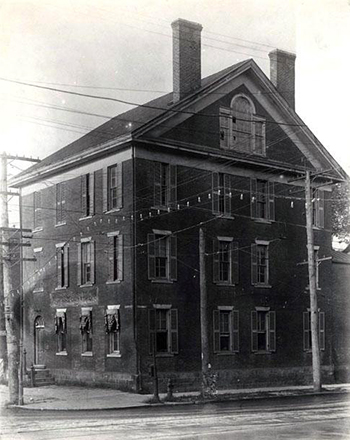See also: Anna Julia Cooper
26 Oct. 1803–20 May 1880

Fabius Julius Haywood, physician and surgeon, was born in Raleigh of English ancestry. His father, John Haywood, born 23 Feb. 1755 at Dunbar Plantation in Edgecombe County, was state treasurer for forty years; his mother, Eliza Eagles Asaph Williams, was the daughter of Colonel John Pugh Williams, a prominent Revolutionary War leader. Eliza was John's second wife; his first wife, Sarah Leigh, died childless. Haywood's paternal ancestor, Colonel John Haywood, born in 1685 on St. Michael's Island, Barbados, British West Indies, emigrated to North Carolina in 1729 as surveyor for Earl Granville.
Fabius Julius Haywood graduated from The University of North Carolina in 1822, and received a medical degree from the University of Pennsylvania School of Medicine in 1827. He then established a medical practice in Raleigh.
Haywood is credited with being the first surgeon in the state to use a general anesthetic during an operation. The Raleigh Star of 9 Feb. 1848 had a vivid account of a procedure Haywood performed on Leroy Moore, a citizen of Wake County, in which was taken "a wen (weighing one pound, four ounces) which grew immediately under his arm. This is not the first time such operations had been successfully performed by Dr. Haywood; though it is the first time, we believe, that chloroform has been used in the state; and the effect was so perfect and happy as if an allwise and merciful providence had prepared it especially for the purpose. Dr. Haywood had previously used Letheon (Martan's trade name for ether) with happy effect in tapping a lady afflicted with dropsy, who twice submitted to the operation without suffering the smallest pain. . . . The anaesthetic properties of chloroform had been described by Sir James Young Simpson of Edinburgh only three months earlier (November 11, 1847)."
During the occupation of Raleigh by the Union Army in 1865–66, Haywood's property, valued at $27,000, was confiscated under the Federal Confiscation Act, and the War Department refused to return it until he had executed an oath of allegiance and received a pardon from President Andrew Johnson granting him amnesty from all acts of wrongdoing against the United States during the recent war.
Haywood was one of the seven original directors of the North Carolina Medical Society, which he helped organize on 17 Apr. 1849. Incorporated on 15 Feb. 1859 as the Medical Society of the State of North Carolina, it, in turn, established the state Board of Medical Examiners.
On 8 Dec. 1831 Haywood married Martha Helen Whitaker, daughter of Cyrus and Mary Rogers Whitaker. Cyrus, a wealthy Wake County landowner, was the son of Thomas and Mary Whitaker of Putnam County, Ga., and the grandson of John Whitaker (1732–84) of Halifax County, N.C. Mary Rogers Whitaker was the daughter of Michael Rogers, onetime Wake County sheriff and a member of the Provincial Congress from Wake County. Dr. Haywood and his wife had a son, Fabius Julius, Jr. (b. 1 Oct. 1840), who entered the Confederate Army soon after enrolling at The University of North Carolina. He was wounded in the leg and captured after successfully passing through enemy lines as courier for his commanding general.
Both Haywood and his wife were interested in the culture of silkworms and planted mulberry trees in their spacious backyard for them to feed on. The top floor of their three-story brick house, which stood on the corner of Fayetteville and Morgan streets opposite the state capitol, was used to store the cocoons from which the enslaved people spun the silk.
Haywood was also an enslaver. According to the Slave Schedules of the 1850 Census, "Fabious J Haywood" of Raleigh was the enslaver of 17 people. Among the people he enslaved were Andrew and Rufus (Haywood). Their mother was Hannah Stanley, who was enslaved by Fabius's brother, George Washington Haywood. Stanley was also mother to Dr. Anna Julia Cooper. Stanley purposefully omitted details of the identity of Cooper's father. Historians have concluded that Cooper's father is either Fabius or his brother, George.
Haywood was a member of Christ Episcopal Church in Raleigh. With his papers in the State Archives is a certificate entitling him to a pew in that church. He died at age seventy-seven and was buried in Oakwood Cemetery, Raleigh. His wife, who died 30 May 1880, was buried beside him.